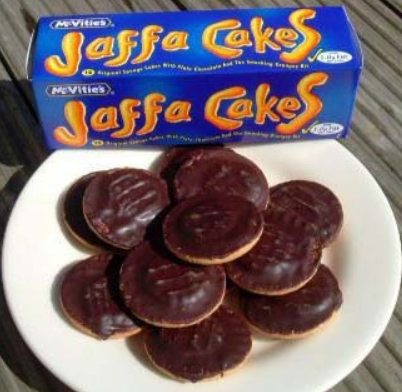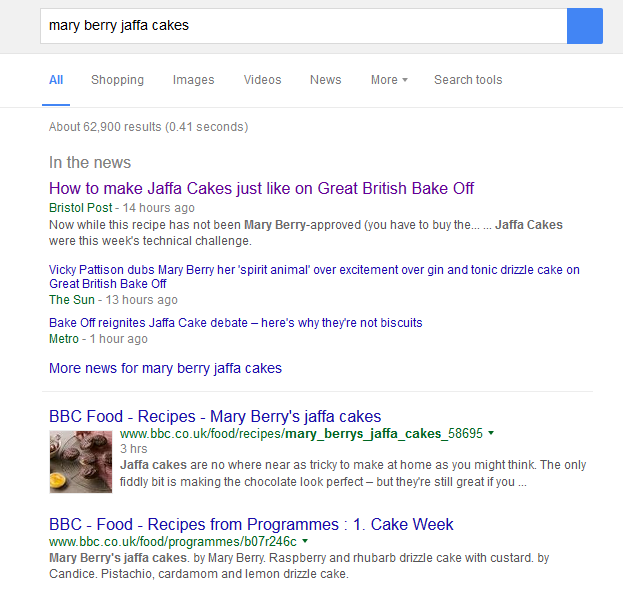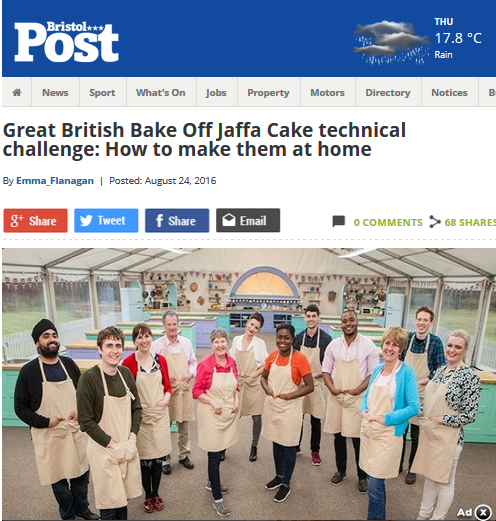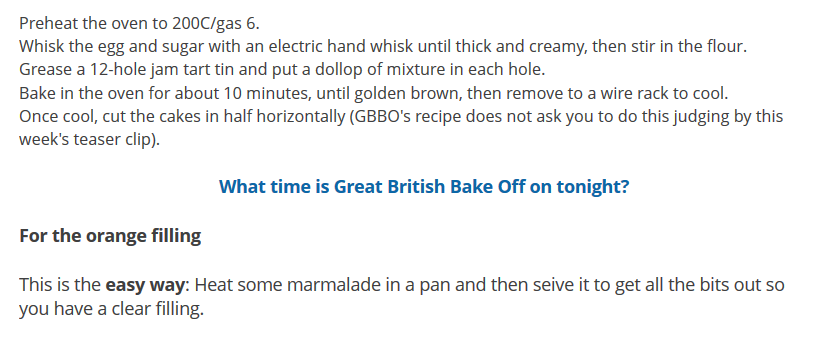How to get to the top of Google – Jaffa Cakes and Bake Off!
26 August 2016 By Northern Lights

Last night I watched Bake Off and – no doubt, like millions of others – thought, why don’t I make Jaffa Cakes? Are they difficult?
So while watching TV I searched ‘Mary Berry Jaffa Cakes’. The Bristol Post item that appeared at the top of my Google search has so impressed me – not for the recipe, though I am sure it is great – but for how to get to the top of Google and engage with your audience that here I share the tips I have spotted. You can use these to get your blogs and website to the top of Google.
It is brilliant!
First of all, what appeared in my Google search?
Now for all the ingredients that made this article appear top of Google. It is worth pointing out that the Bristol Post is a news source and therefore appearing top of ‘In the News’. However, all the principles below are still relevant – and here you have a regional paper appearing ahead of The Sun and Metro.
- Tap into what people are searching
The Great British Bake Off (GBBO) is now embedded in British culture – the 2015 final attracted more than 13 million viewers, making GBBO the most watched TV show of the year.
Baking is now a water cooler topic. You can work out that millions will be watching and searching to find out more about the contestants (is he really a vicar?), the recipes – from lemon drizzle cake to mirror glazes (what on earth is a mirror glaze?) to the Jaffa Cakes of this article. In fact, I have just seen that last night was another record with more than 10m viewers for the launch Bake Off programme.
These questions are your gold dust. What questions are people going to ask while watching? What recipes might they want?
- What will people search?
The Bristol Post, which wrote this article, had clearly thought about what people are going to search for online. So here are just some of the keywords they have included in the article
- Great British Bake Off
- Week one’s technical challenge
- Here is how to make Jaffa Cakes
- Mary Berry
- Jaffa Cake recipes
- What time is Great British Bake Off on tonight?
- Who are this series’ GBBO bakers?
- How to make them at home
Notice how it is not just the words they are thinking about, but the exact phrases people might type in.
- Great headline
The headline has all the elements to work for search – but it has great clickability (you want to click, open and read).
At times we are all struggling to find a great heading that makes you want to read – but in this case, there will be lots of people simply searching for the Bake Off recipe for Jaffa Cakes. And you know this is the one you need because it tells you how to make them at home?!
Top clickability.
- It delivers on the promise
Years ago, I went to a conference for people working in search engine optimisation (SEO) – these were people practising black hat techniques of SEO. At the time, I felt uncomfortable about the tricks of the trade (this is the blog I wrote at the time Were there any killer tips to improve SEO? As an aside, interesting reading to see how Google has changed – thank goodness – and how the market has moved on).
Malcolm Coles told a story about how he had written a blog on Pippa Middleton’s a*** on the Royal Wedding day. He got hundreds of thousands of hits on that day. But I have to say I was left completely puzzled. He got the hits, but how did that relate to his business – and would it convert to sales?
In my view, there is a danger of being too clever in getting traffic to your website – and then people being disappointed because the content didn’t deliver what they were really searching for. Actually – I could be accused of that in this article but I hope the heading is clear, this blog is about the trending of Jaffa Cakes, not a recipe for them.
In the case of the Bristol Post they have delivered a great Jaffa Cake recipe, which is what you were searching for. They are upfront that it is not Mary Berry’s recipe – but tell you how to get hold of that. And the recipe is laid out with clear ingredients and even easy and difficult ways to make the orange jelly filling.
- The keywords are included naturally
This article was clearly written to help the reader. Any keywords, such as Jaffa Cakes, were a natural part of the copy, nothing was forced in. (Actually there were two questions written as sub-copy – such as What time is Great British Bake Off on tonight? – but somehow they don’t jar here. Probably because it’s online media. It still feels relevant).
- References to great quality sites
One of the tricks for getting to the top of Google is to be generous and helpful with your information. Professionals really struggle with this – the idea of giving credit to a competitor does not sit comfortably with many.
This article references other quality places that you can get a good Jaffa Cake recipe – and when you click they land on the page you are expecting, Jamie Oliver’s Jaffa Cake recipe page.
That may sound obvious, but how many regional newspaper sites deliver that? I have given up on the Yorkshire Post because their click-throughs always went to advertisements. They may have been able to say to advertisers ‘we got 2,000 clicks to your advertisement’ but I bet it did nothing for the advertiser’s brand and more to the point, did it convert to business?
Google – for obvious reasons – ranks the relevance of your hyperlinks to the article and the website page to the hyperlink you have created. As an example, I just did a hyperlink across the words earlier ‘relevance of your hyperlinks’. If you click on this, it goes to a blog titled What are Hyperlinks and why are they relevant for SEO’ and there is a paragraph in that blog about the importance of hyperlink relevance.
If you want to come top of Google, these details all contribute to how your website or blog is performing. Good content, quality links, relevance of content all matter.
Jumping on a bandwagon has been an age-old PR trick (every man and his dog jumped on the Olympics?). But the principles are every bit as relevant in social media and particularly blogging.
What trends have you tapped into – and how well did they work?




